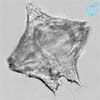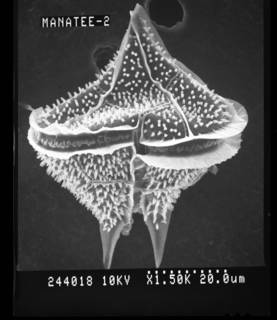Scheldt species taxon details
Protoperidinium divergens (Ehrenberg) Balech, 1974
110219 (urn:lsid:marinespecies.org:taxname:110219)
accepted
Species
marine
Not documented
Guiry, M.D. & Guiry, G.M. (2025). AlgaeBase. World-wide electronic publication, National University of Ireland, Galway (taxonomic information republished from AlgaeBase with permission of M.D. Guiry). Protoperidinium divergens (Ehrenberg) Balech, 1974. Accessed through: VLIZ Consortium Scheldt Species Register at: https://www.scheldemonitor.nl/speciesregister/aphia.php?p=taxdetails&id=110219 on 2025-09-12
VLIZ Consortium. Scheldt Species Register. Protoperidinium divergens (Ehrenberg) Balech, 1974. Accessed at: https://www.scheldemonitor.org/speciesregister/aphia.php?p=taxdetails&id=110219 on 2025-09-12
Date
action
by
2015-06-26 12:00:51Z
changed
db_admin
2019-07-12 06:20:28Z
changed
db_admin
context source (Schelde)
Maris, T., O. Beauchard, S. Van Damme, E. Van den Bergh, S. Wijnhoven & P. Meire. (2013). Referentiematrices en Ecotoopoppervlaktes Annex bij de Evaluatiemethodiek Schelde-estuarium Studie naar “Ecotoopoppervlaktes en intactness index”. [Reference matrices and Ecotope areas Annex to the Evaluation methodology Scheldt estuary Study on “Ecotope areas and intactness index”. <em>Monitor Taskforce Publication Series, 2013-01. NIOZ: Yerseke.</em> 35 pp. (look up in IMIS) [details]
basis of record Guiry, M.D. & Guiry, G.M. (2025). AlgaeBase. <em>World-wide electronic publication, National University of Ireland, Galway.</em> searched on YYYY-MM-DD., available online at http://www.algaebase.org [details]
basis of record Gómez, F. (2005). A list of free-living dinoflagellate species in the world's oceans. <em>Acta Bot. Croat.</em> 64(1): 129-212. [details]
additional source Guiry, M.D. & Guiry, G.M. (2025). AlgaeBase. <em>World-wide electronic publication, National University of Ireland, Galway.</em> searched on YYYY-MM-DD., available online at http://www.algaebase.org [details]
additional source Integrated Taxonomic Information System (ITIS). , available online at http://www.itis.gov [details]
additional source Tomas, C.R. (Ed.). (1997). Identifying marine phytoplankton. Academic Press: San Diego, CA [etc.] (USA). ISBN 0-12-693018-X. XV, 858 pp., available online at http://www.sciencedirect.com/science/book/9780126930184 [details]
additional source Brandt, S. (2001). Dinoflagellates, <B><I>in</I></B>: Costello, M.J. <i>et al.</i> (Ed.) (2001). <i>European register of marine species: a check-list of the marine species in Europe and a bibliography of guides to their identification. Collection Patrimoines Naturels,</i> 50: pp. 47-53 (look up in IMIS) [details]
additional source Martin, J. L.; LeGresley, M. M. ; Strain, P. M. (2001). Phytoplankton monitoring in the Western Isles region of the Bay of Fundy during 1997-98. <em>Canadian Technical Report of Fisheries and Aquatic Sciences 2349.</em> 4: 1-85. [details]
additional source Steidinger, K. A., M. A. Faust, and D. U. Hernández-Becerril. 2009. Dinoflagellates (Dinoflagellata) of the Gulf of Mexico, Pp. 131–154 in Felder, D.L. and D.K. Camp (eds.), Gulf of Mexico–Origins, Waters, and Biota. Biodiversity. Texas A&M Press, College [details]
additional source Liu, J.Y. [Ruiyu] (ed.). (2008). Checklist of marine biota of China seas. <em>China Science Press.</em> 1267 pp. (look up in IMIS) [details] Available for editors
additional source Lakkis, S. (2011). Le phytoplancton marin du Liban (Méditerranée orientale): biologie, biodiversité, biogéographie. Aracne: Roma. ISBN 978-88-548-4243-4. 293 pp. (look up in IMIS) [details]
additional source Chang, F.H.; Charleston, W.A.G.; McKenna, P.B.; Clowes, C.D.; Wilson, G.J.; Broady, P.A. (2012). Phylum Myzozoa: dinoflagellates, perkinsids, ellobiopsids, sporozoans, in: Gordon, D.P. (Ed.) (2012). New Zealand inventory of biodiversity: 3. Kingdoms Bacteria, Protozoa, Chromista, Plantae, Fungi. pp. 175-216. [details]
additional source Steidinger, K.A.; Tangen, K. (1997). Dinoflagellates. pp. 387-584. In: C.R. Tomas (ed.) (1997). Identifying Marine Phytoplankton. Academic Press: San Diego, CA [etc.] (USA). ISBN 0-12-693018-X. XV, 858 pp., available online at http://www.sciencedirect.com/science/article/pii/B9780126930184500057 [details]
new combination reference Balech, E. (1974). El genero Protoperidinium Bergh 1881 (Peridinium Ehrenberg 1831, partim). <em>Revista del Museo Argentino de Ciencias Naturales "Bernardino Rivadavia" (Hidrobiología).</em> 4: 1-79. [details] Available for editors
basis of record Guiry, M.D. & Guiry, G.M. (2025). AlgaeBase. <em>World-wide electronic publication, National University of Ireland, Galway.</em> searched on YYYY-MM-DD., available online at http://www.algaebase.org [details]
basis of record Gómez, F. (2005). A list of free-living dinoflagellate species in the world's oceans. <em>Acta Bot. Croat.</em> 64(1): 129-212. [details]
additional source Guiry, M.D. & Guiry, G.M. (2025). AlgaeBase. <em>World-wide electronic publication, National University of Ireland, Galway.</em> searched on YYYY-MM-DD., available online at http://www.algaebase.org [details]
additional source Integrated Taxonomic Information System (ITIS). , available online at http://www.itis.gov [details]
additional source Tomas, C.R. (Ed.). (1997). Identifying marine phytoplankton. Academic Press: San Diego, CA [etc.] (USA). ISBN 0-12-693018-X. XV, 858 pp., available online at http://www.sciencedirect.com/science/book/9780126930184 [details]
additional source Brandt, S. (2001). Dinoflagellates, <B><I>in</I></B>: Costello, M.J. <i>et al.</i> (Ed.) (2001). <i>European register of marine species: a check-list of the marine species in Europe and a bibliography of guides to their identification. Collection Patrimoines Naturels,</i> 50: pp. 47-53 (look up in IMIS) [details]
additional source Martin, J. L.; LeGresley, M. M. ; Strain, P. M. (2001). Phytoplankton monitoring in the Western Isles region of the Bay of Fundy during 1997-98. <em>Canadian Technical Report of Fisheries and Aquatic Sciences 2349.</em> 4: 1-85. [details]
additional source Steidinger, K. A., M. A. Faust, and D. U. Hernández-Becerril. 2009. Dinoflagellates (Dinoflagellata) of the Gulf of Mexico, Pp. 131–154 in Felder, D.L. and D.K. Camp (eds.), Gulf of Mexico–Origins, Waters, and Biota. Biodiversity. Texas A&M Press, College [details]
additional source Liu, J.Y. [Ruiyu] (ed.). (2008). Checklist of marine biota of China seas. <em>China Science Press.</em> 1267 pp. (look up in IMIS) [details] Available for editors
additional source Lakkis, S. (2011). Le phytoplancton marin du Liban (Méditerranée orientale): biologie, biodiversité, biogéographie. Aracne: Roma. ISBN 978-88-548-4243-4. 293 pp. (look up in IMIS) [details]
additional source Chang, F.H.; Charleston, W.A.G.; McKenna, P.B.; Clowes, C.D.; Wilson, G.J.; Broady, P.A. (2012). Phylum Myzozoa: dinoflagellates, perkinsids, ellobiopsids, sporozoans, in: Gordon, D.P. (Ed.) (2012). New Zealand inventory of biodiversity: 3. Kingdoms Bacteria, Protozoa, Chromista, Plantae, Fungi. pp. 175-216. [details]
additional source Steidinger, K.A.; Tangen, K. (1997). Dinoflagellates. pp. 387-584. In: C.R. Tomas (ed.) (1997). Identifying Marine Phytoplankton. Academic Press: San Diego, CA [etc.] (USA). ISBN 0-12-693018-X. XV, 858 pp., available online at http://www.sciencedirect.com/science/article/pii/B9780126930184500057 [details]
new combination reference Balech, E. (1974). El genero Protoperidinium Bergh 1881 (Peridinium Ehrenberg 1831, partim). <em>Revista del Museo Argentino de Ciencias Naturales "Bernardino Rivadavia" (Hidrobiología).</em> 4: 1-79. [details] Available for editors
 Present
Present  Inaccurate
Inaccurate  Introduced: alien
Introduced: alien  Containing type locality
Containing type locality
PlanktonNet Image
Published in AlgaeBase
To Biodiversity Heritage Library (10 publications)
To Biological Information System for Marine Life (BISMaL)
To Dyntaxa
To European Nucleotide Archive, ENA (Protoperidinium divergens)
To GenBank (6 nucleotides; 0 proteins)
To Global Biotic Interactions (GloBI)
To NMNH Extant Collection (244018.jpg)
To PESI
To ITIS
Published in AlgaeBase

To Biodiversity Heritage Library (10 publications)
To Biological Information System for Marine Life (BISMaL)
To Dyntaxa
To European Nucleotide Archive, ENA (Protoperidinium divergens)
To GenBank (6 nucleotides; 0 proteins)
To Global Biotic Interactions (GloBI)
To NMNH Extant Collection (244018.jpg)
To PESI
To ITIS

